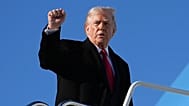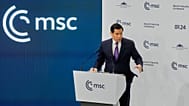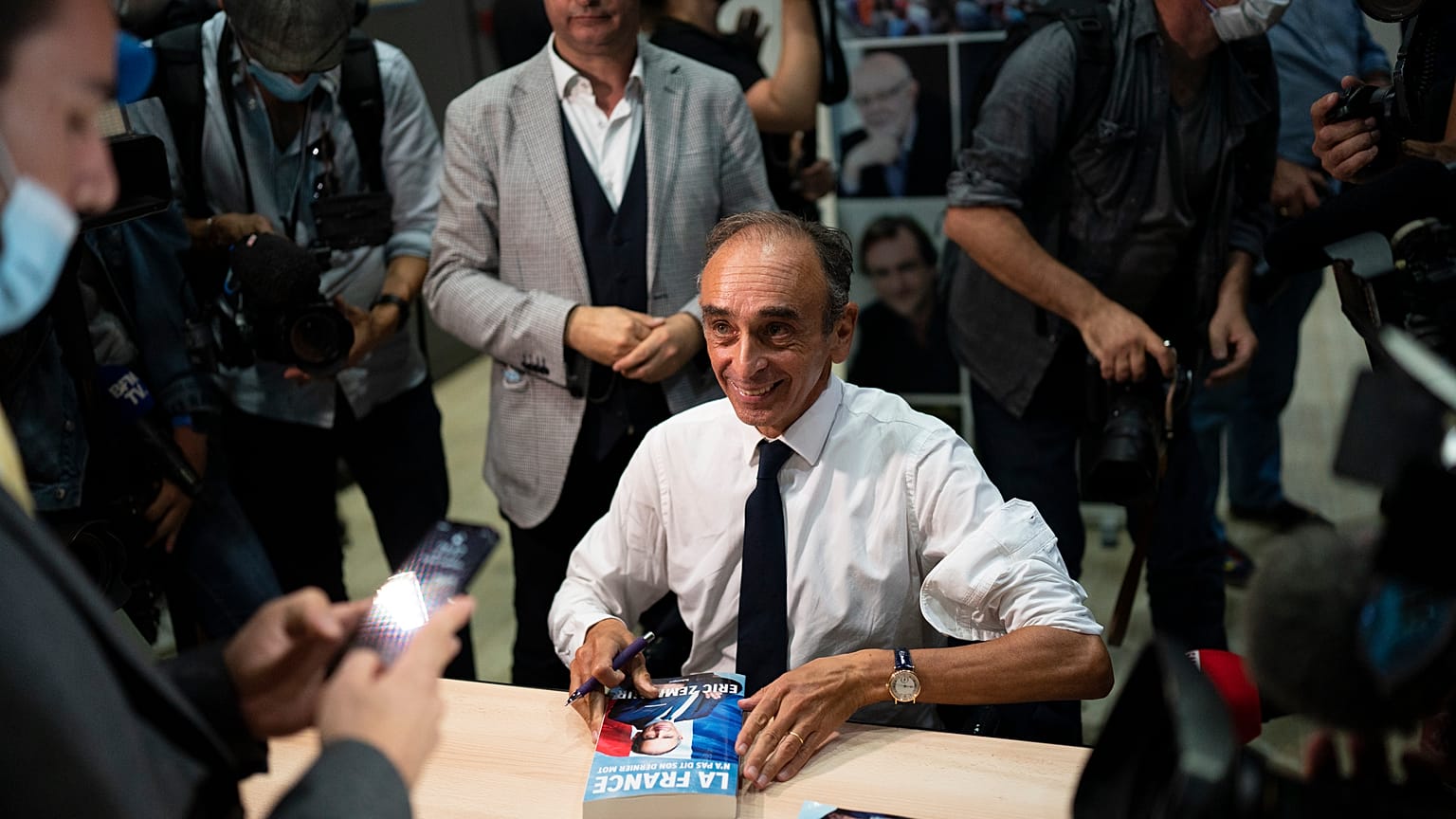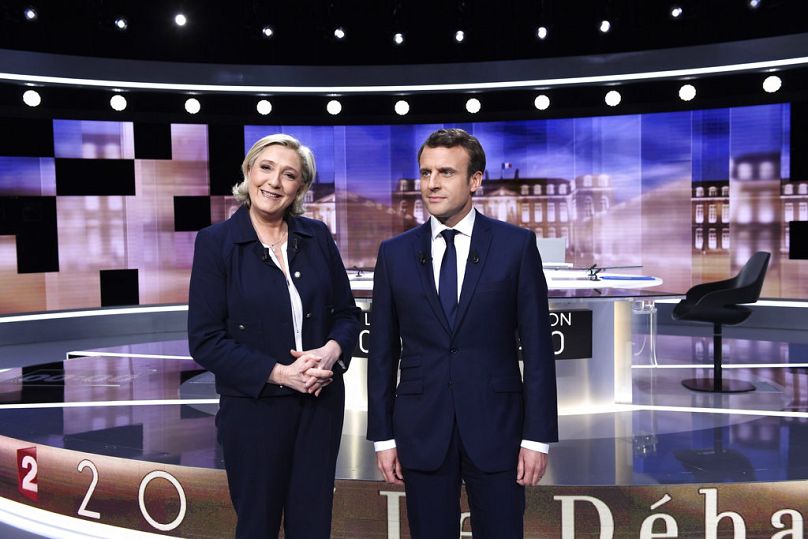With five months to go before France's next presidential election, a new personality has burst onto the scene: Eric Zemmour.
Whether it's Jean-Marie or his daughter Marine, the Le Pens have been dominant figures on the extremes of France's right-wing for decades.
 ADVERTISEMENT
ADVERTISEMENT
 ADVERTISEMENT
ADVERTISEMENT
But, now, with five months to go before France's next presidential election, a new personality has burst onto the scene: Eric Zemmour.
After months of conjecture, the political novice in November confirmed he's entering the race.
Yet even before his declaration, he was causing a media frenzy with his frequent television appearances and polarising views.
Zemmour's televised debate with far-left leader Jean-Luc Mélenchon drew 3.8 million viewers. He has also grabbed countless headlines, including a glamorous Paris Match cover featuring him bathing in the Mediterranean with his 28-year old female advisor.
Zemmour has long been a household name in France. He has until recently been a regular columnist at Le Figaro and other newspapers, as well as an outspoken TV commentator famed for his provocations on Islam, immigration or women.
A poll released in October placed him -- for the first time -- in a second-round run-off against Macron to be France's next president. The survey gave Zemmour a 17% to 18% vote share, ahead of Marine Le Pen's 15% to 16% and any of the centre-right candidates.
So, what does Eric Zemmour stand for and how much can he disrupt the French presidential election?
Euronews explores the reasons behind his spectacular rise in the polls and its potential fallout for the political forces in the country.
Who is Eric Zemmour?
Zemmour, 63, was born in a Paris suburb to a Jewish family from Algeria that came to France during the 1954-62 Algerian War. His father Roger was a paramedic, while his mother Lucette stayed at home.
A graduate of Sciences Po University, he became a journalist after failing twice to join the prestigious Ecole Nationale d'Administration -- the school of government that has trained most of the French presidents, including Emmanuel Macron.
"Eric Zemmour became a television celebrity for his ability to debate. He is a polemicist who's renowned for his extensive culture and his very good ability to defend and communicate his ideas. And he first had the reputation of someone who has a passion for oratorical jousting," said political analyst Bruno Cautrès, of the Center for Political Research at Sciences Po in Paris.
"And you know that in France, politics still works a lot on oratory talent -- the ability to make speeches, to stir up great ideas --- which I believe is important in French culture and in our political life," the specialist of the French right said.
Zemmour's latest show on CNews -- a right-wing television network that has drawn comparisons with Fox News -- drew hundreds of thousands of viewers on a daily basis. In one show last year, he called unaccompanied migrant children "robbers", "murderers" and "rapists". The comments led him to court over charges of incitement to hatred. He has been convicted once for the same charge, with multiple other cases against him underway.
But he had to step down from his role as a prime-time commentator on CNews after France’s CSA media regulator ruled last month that the 63-year old should be considered a politician, not a journalist, meaning his airtime should be subject to limitations.
Zemmour has also been a prolific book writer with dozen political and historical essays published since the mid-1990s. The French Suicide: 40 years that defeated France, which instantly became a best-seller when it was published in 2014, blames France's decline on the progressive legacy of May 1968. France Hasn’t Said its Last Word, his latest book, reportedly sold over 131,000 copies in just 12 days, according to right-wing newspaper Valeurs Actuelles.
What are Zemmour's political views?
"Eric Zemmour is a writer, a journalist who, for twenty years, has been alerting the public opinion and our leaders to the fact that our country cannot cope with a completely deregulated immigration like the one we have known for decades; that security is the first of freedoms; that figures for petty crimes, attacks on property and people are skyrocketing and that soon, in France, we will have a serious problem with that," said Antoine Diers, a spokesman for the Association of Eric Zemmour's Friends. The group raises funds for a potential presidential campaign.
The place of Islam in France is another of Zemmour's leitmotiv. In a recent interview, he said "Islam is a civilisation incompatible with the principles of France," and called to "frenchise the practice of Islam" in the country.
"I would add that Eric Zemmour is rather largely what one calls a declinist, that is to say, the idea that France was better off before and that the power of France, the support and respect that France inspires abroad, its influence in international relations have only declined. And that without a surge of national spirit, France is poised to disappear," Cautrès said.
Zemmour is also known for his anti-feminist -- critics say misogynistic -- views. In his book The First Sex (2006) he slams "the feminisation of society" and promotes an essentialist vision of gender roles.
He regularly denounces so-called LGBT "propaganda" and has compared a recent government initiative to facilitate the integration of transgender children in school to the experiments of Dr Mengele, a Nazi physician famed for his atrocities on concentration camps prisoners during World War II.
While Zemmour's views have their adepts, they have unsurprisingly drawn strong backlash in French society. A poll published in late September suggests he is the political personality inspiring the most "rejection" to French voters, with 59% saying they reject him.
How far on the right is Zemmour?
"Very clearly, he is someone who is very much to the right of the political spectrum," said Cautrès, "both on the socio-economic axis and on the cultural axis."
The political analyst said Zemmour was "somewhere between the far-right fringe" of Les Républicains conservative party and the movement of Marion Maréchal, the niece of Le Pen. Both want a "union of the rights," the political analyst said, that is to say, a coalition between Les Républicains and Marine Le Pen's Rassemblement National.
Diers himself is a member of Les Républicains party and says he sees "no contradiction" with his role at the Association of Eric Zemmour's friends.
"I think Les Républicains should give their support to Eric Zemmour in a very formal way," the militant told Euronews, "because Les Républicains voters have long been waiting for someone like him on immigration, justice and security issues."
Les Républicains are yet to choose their candidate for the presidential race, but it is highly unlikely to be Zemmour. The party recently adopted what has been dubbed as an "anti-Zemmour" clause, allowing its leadership to invalidate applications that are not in line with "the values of the right and the centre."
On whether Zemmour and Rassemblement National are two sides of the same coin, Cautrès said: "there are areas of intersection on the issue of immigration, that is extremely clear. It is this idea that 'France is no longer France' because it has welcomed too many immigrants."
Jean-Yves Camus, Director of the Observatory of Radical Politics at the Jean Jaures Foundation, fell short of calling Zemmour "far-right".
"It's a radical right," he said, noting that "Zemmour, as an individual, has never campaigned on the far right. He was never a member of the National Front. He calls himself a Gaullist," a reference to France's World War II hero and ex-president Charles De Gaulle.
But in a recent interview to Le Monde newspaper, far-right hardliner Jean-Marie Le Pen expressed his support for Zemmour and said: "The only difference between Eric and myself is that he is Jewish." The far-right veteran, who was sentenced several times for his antisemitic and negationist comments, says Zemmour's background makes it a lot more difficult to accuse him of being a Nazi or a fascist.
What are the reasons behind Zemmour's rise?
On what was driving his champion's popularity, Diers said: "Eric Zemmour is not a politician. Eric Zemmour is someone who talks about the country, its difficulties and its future. And he is very successful, precisely because he speaks about the reality of our country without using the doublespeak of our politicians."
"The real question is whether [Zemmour's rise in the poll] is a media bubble which is linked to his overexposure in the media -- an overexposure which is likely to continue -- or if it is a real, deeper phenomenon which sees Marine Le Pen losing voters due to a fatigue after her party repeatedly failed to conquer power," Camus told Euronews.
"The oratorical talent of Eric Zemmour, whom everyone recognises, could appear to some voters as something that Marine Le Pen does not know how to do, or no longer knows how to do," said Cautrès.
Recalling how Marine Le Pen "failed" in the TV debate with Macron between the two rounds of the presidential election in 2017, Cautrès said some Rassemblement National voters might fear that "Macron would once again dominate Marine Le Pen intellectually".
"And maybe part of the electorate of the Rassemblement National feels that Marine Le Pen, in trying to increase her score in the second round, to become more presidential, has become too mainstream for them and not radical enough," the political analyst went on.
Another factor, Cautrès told Euronews, is a "feeling of impasse in French political life for several years, and in particular since the election of Emmanuel Macron in 2017."
"Many French voters have had the feeling that a runoff between Emmanuel Macron and Marine Le Pen was unavoidable. But even if he has regained popularity since the yellow vests crisis, Emmanuel Macron's image remains highly divisive in the French population."
Zemmour, therefore, appears to some French voters as the only option to escape the long-awaited duel, with Le Pen's defeat almost certain.
The difficulties of Les Républicains party, which hasn't been in power since President Nicolas Sarkozy lost to Socialist François Hollande in 2012, are another factor.
Zemmour's popularity among some of Les Républicains's voters reveals "the deep divisions within the right-wing electorate between on the one hand people who are moderate conservatives, economic liberals but open and pro-European, and another part of the electorate focused on sovereignty and immigration issues. Ultimately, maybe these two groups that have managed to coexist within the party so far will go their separate ways in the future," Camus told Euronews.
How much can Zemmour influence the outcome of the presidential election?
Experts interviewed by Euronews said opinion polls predicting huge scores for Zemmour should be taken with caution.
"Today we have to be extremely cautious about voting intentions. A significant portion of voters are not yet interested in the presidential election and continue to hesitate, including between voting and abstaining," Cautrès said.
Capturing the vote of the working class will be central to Zemmour's ability to shape the outcome of the election, the political analyst told Euronews.
"Marine Le Pen continues to have the support of working-class categories, especially precarious, young working poor voters, whereas Eric Zemmour, for the moment, is rather a candidate supported by men with rather bourgeois socio-economic positions, certain fringes of business circles, craftsmen, shop owners and older voters," said Cautrès.
"Eric Zemmour's ability to turn the tables will only be significant if he manages to unseat Marine Le Pen in working-class categories. If he can do that, then indeed, the presidential election is becoming more and more unpredictable. And in that case, he could possibly prevent Marine Le Pen from qualifying for the second round," the political analyst went on.
Under this scenario, Zemmour could not just become a problem for the far-right.
"If Eric Zemmour prevents Marine Le Pen from qualifying in the second round and the centre-right candidate is opposed to Emmanuel Macron in the second round, then this runoff becomes in my opinion, very open and very uncertain for Emmanuel Macron," Cautrès told Euronews.
But according to Camus, no candidate from Les Républicains, let alone Le Pen or Zemmour is currently in a position to win against Macron in the runoff.
"Emmanuel Macron's adversaries on the right are profoundly divided, and he's also attracting centre-right voters who have rallied the government from the beginning of his term," the expert told Euronews.
The same Harris-Interactive Challenge poll that predicted Zemmour would be in the runoff against Macron also found that the incumbent president would win with 55% of the votes against the TV pundit, compared to 53% against Le Pen. Xavier Bertrand, currently the best placed among aspiring candidates from Les Républicains, would also lose to Macron according to the same poll, but by a much shorter margin (49% to 51%).















